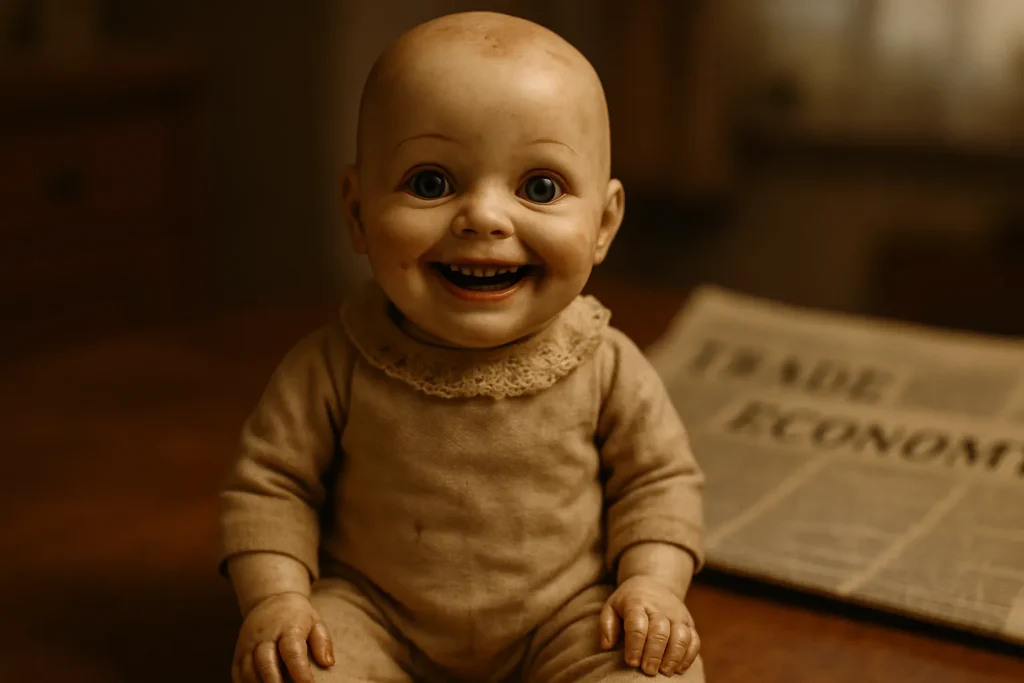Awkward Analogies and Uncomfortable Obsessions
Television’s sharpest satirists often find their best material in politics, but Donald Trump’s latest comments about tariffs and children’s dolls seemed almost scripted for late-night ridicule. When Trump attempted to explain the impact of his trade war with China, he invoked not just economic jargon but unsettlingly awkward anecdotes about girls and their dolls—remarks that sent a ripple of unease across social media and quickly became fodder for HBO’s John Oliver.
Trump told supporters that due to tariffs, American children might need to settle for fewer dolls: “Maybe instead of 30 dolls, little girls have three or four.” He then doubled down by asserting that even 11-year-olds—or, bizarrely, 15-year-olds—are prime candidates for doll play, demonstrating his, at best, tone-deaf and, at worst, disturbingly out-of-touch worldview about childhood, gender, and the lived experiences of American families.
John Oliver, ever the incisive observer, seized upon Trump’s misstep on Last Week Tonight. The comic quipped, “Every single way this man refers to girls makes my skin want to turn inside out,” an indictment that felt both humorous and chilling—as much a cathartic eye roll as a genuine warning sign. Oliver’s critique was not limited to the strangeness of Trump’s analogy, but also exposed a deeper pattern in conservative political rhetoric: a penchant for bizarre, outdated, and sometimes downright unsettling representations of women and children.
Why dolls? The question is as revealing as the answer. Trump’s reference to inflated toy prices was, ostensibly, an attempt to translate abstract economic pain into household terms. But the choice of dolls—a classic, almost cliché symbol of girlhood—paired with the president’s fixation on girls’ ages and numbers, drew attention away from economics and into uncomfortable territory. Late-night viewers weren’t alone in their discomfort; social psychologist Dr. Susan Weitz highlighted via NPR that “casual references to children’s private lives, particularly girls, by male authority figures often carry a cultural charge with troubling historical precedent.”
Satirical Fire: Mocking the Bizarre Fixation
Oliver did what he does best, launching into a barrage of satirical scenarios: Would Trump next suggest a “45-year-old girl, still young at heart,” stockpiling dolls in her retirement years? Might he reference “12 Apostles” or “12 Angry Men” just to bolster his metaphors? The comic’s escalating parody underscored just how unnatural Trump’s statements sounded—as if conjured from a fever dream of stereotypes and sales pitches, not a genuine understanding of American family life.
The show’s writers didn’t stop at the doll remarks. Oliver, always keen to connect the dots, linked Trump’s awkwardness around girls with his well-documented, profoundly troubling association with Jeffrey Epstein. “Has he ever met a 15-year-old girl? Given his friendship with Epstein, I’d hope not,” Oliver deadpanned, invoking a public history that cannot be dismissed by any reasonable standard of accountability. Political science professor Sara Markov of Georgetown University says such comic indictments “work as both cultural mirror and megaphone, reminding viewers that awkwardness in political speech can reveal deeper, structural attitudes and failures.”
Beyond that, Oliver contextualized Trump’s gaffe within a pattern of bizarre comments involving children, from the “lawn boy scream” incident to asking a child about believing in Santa Claus at “the marginal age of seven.” These throwaway lines may seem innocuous or even amusing in isolation, but, according to pediatrician Dr. Marcus Green, “Repeated normalization of awkward, gendered remarks about children by powerful men erodes our sense of propriety and respect.”
“To think the prime age for playing with dolls is 11 is almost impressively wrong.” — John Oliver
Oliver’s retort, “the prime age for playing with dolls is 11 is almost impressively wrong,” stung not simply because it was funny—psychologists routinely note that, by age eight, most children (girls included) move on from dolls to other interests—but because it exposed a profound, persistent ignorance in Trump’s attempts at relatable empathy. Sociologist Emily Gertz, writing in The Atlantic, notes, “Imprecise, antiquated stereotypes about girls are not only factually incorrect but can do real harm by perpetuating a narrow sense of normalcy.”
What’s Really at Stake: Policies Hidden in Plain Sight
Do these barbs matter when trade policies hang in the balance? The answer lies not only in the laughter but in the implications for how policy debates are framed and whose interests are prioritized. Trump’s childish analogies serve to distract from real conversations about the meat of his China tariffs: the increased costs for families, the precariousness of working-class jobs, the looming threat of recession. By centering the debate around a nostalgic, borderline “Mad Men” vision of American girlhood, the administration avoids talking about wage stagnation, education shortfalls, and the unequal burden regressive tariffs place on marginalized communities.
Expert after expert points out the disconnect. According to a recent Pew Research study, nearly 60% of Americans expressed concern that tariffs on everyday commodities disproportionately harm low- and middle-income families. Harvard economist Laura Chen notes, “When the White House tries to sugarcoat policy impacts with retrograde imagery, it signals not just a lack of economic literacy, but a deeper unwillingness to confront how these choices actually affect diverse American households.”
Satirical takedowns like Oliver’s not only entertain but illuminate—they name what many feel uncomfortable saying aloud. The oddity is not just Trump’s doll anecdote itself, but the way such rhetorical strategies work to mask, even normalize, ill-conceived policy that leaves those least able to bear economic setbacks footing the bill. It’s a familiar pattern in conservative playbooks: deflect, infantilize, distract. The louder the talk about dolls and “beautiful baby girls,” the less room remains for meaningful, adult policy conversation.
A closer look reveals the need for vigilant, values-driven critique—not just of overtly sexist gaffes, but of the economic decisions they are slyly deployed to obscure. For progressives—and for any American invested in equality and dignity—the lesson is clear: Challenge the script, challenge the framing, and never let distraction be dressed up as deliberation.

